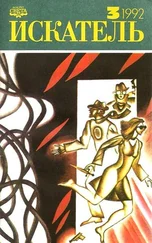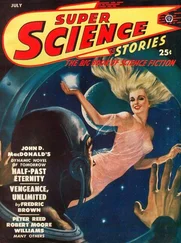“Look, I have to see it.” Leo’s tone was patient and bored, and Davis knew the man had no interest in what he thought and very little interest in why he had come here.
He held his hand out and the little wafer gleamed on his open palm. Leo took it, glanced at it, and put it in his own pocket.
“They didn’t tell me you’d keep it.”
“The room you want is four-two-four-two.”
“Are you supposed to keep it? Did they make that clear?”
“Forty-two forty-two. Four thousand, two hundred and forty-two, Mr. Davis. OK?”
“All right. I’ll assume you’re supposed to keep it, Leo. It’s their problem, not mine. But you’re supposed to turn over the key. I know that.”
“I can’t, buddy, because the only keys here are the keys to the main house here. You should know that and they should know that. Right? What we’re talking about is the annex. Which is being tom down.”
“Then there isn’t anybody in it?”
“Did I say that, mister? Did anybody say that?”
“There’s no reason to get ugly about it, Leo.”
“Who’s ugly? Listen, they got old foops in there living there since the year one, and lease agreements and all that stuff, so about the only thing they can do is work around them until they get sick of all the noise and mess and get out. There aren’t many left now. I think maybe your party is the only one left on that floor, but I don’t keep close track. I’ve got enough to do here without worrying about over there.”
“So what do I do about a key? Am I supposed to go knock on the door, for God’s sake?”
“Mrs. Dorn is over there. She’s got a master key to the whole annex.”
“Does she know about me?”
“Why should she? Just con her a little, Mr. Davis. Play it by ear. OK?”
“I don’t have much choice, I guess.”
“Has anybody lately? Come this way.”
Leo led the way through the lobby and through a huge empty kitchen, where night lights picked up the gleam and shape of stainless-steel racks and tables. He pulled a door open and turned on a weak bulb at the head of a narrow flight of stairs.
“The regular way over there has been boarded up, so what you do is just follow the way a red pipe runs along the ceiling there, and when you come to stairs finally, go on up and you’ll find her around someplace.”
Three steps down, he turned to say his thanks in some massively sarcastic way; but as he turned, the door was slammed. There were distant lights in the vast reaches of the basement, just enough for him to make out the red pipe suspended by straps from the low ceiling overhead. There was a sweaty dampness in the basement. In some far comer, a laboring machine was making a slow and heavy chuffing sound. It made a vibration he could feel through the soles of his shoes as he walked. He noticed that the red pipe overhead was of some kind of plastic material, sufficiently flexible so that there was a perceptible expansion and contraction as the machine made its thick and rhythmic sound.
He estimated that he had walked more than a city block before he came to the stairs, where the red pipe disappeared into a wall. These were unexpectedly wide and elegant stairs, marble streaked with gray and green, ascending in a gentle curve. At the top of the stairs, he pushed a dark door open and found himself in an enormous lobby. It had the silence of a museum. Dropcloths covered the shapes of furniture. Plaster dust was gritty on the floor. Some huge beams had fallen and were propped at an angle, as in pictures of bombings.
“Mrs. Dorn!” he called. “Mrs. Dorn!” The sound did not seem to carry. It died at once into the silence.
Then he heard a click-tock of high heels, and he could not tell where the sound was coming from. “Yes?” she said. “You, there! Up here!” Her voice was musical; the tone, impatient. He looked up and saw her standing at the broad ornate railing of a mezzanine floor, looking down at him, in silhouette against a window beyond her. “Yes? What do you want?”
“Can I speak to you a minute?”
“I’m very busy. Well... come on up.”
She turned away. He looked around and saw the stairs and went up. There was a library and writing room at the top of the stairs. Several doors opened from the room. He tried them, one by one, and found they opened onto corridors. Then, close behind him, she chuckled, and as he turned, startled, she said, “It’s really very confusing. I used to get hopelessly lost when I first came here.”
She looked like someone he had known, somewhere, perhaps a long time ago. She had a soft and pretty face, dark wings of careless hair, and she looked at him in a familiar and mocking way of old secrets shared. She wore a shift of some tweedy gray substance over a young, sturdy body with a vital heft of hip and weight of breast.
“I wonder, Mrs. Dorn, if you could...”
“Just a moment, please. I missed this room somehow, and the crews will be arriving any minute, and it would be just my rotten luck if they started here, wouldn’t it?” She began to walk slowly around the room, pausing from time to time, pausing to hold at arm’s length a piece of soft yellow chalk in the measuring gesture of the artist. She nodded to herself from time to time and then would mark with the chalk a piece of paneling, or a chair, or the frame of an old painting.
At last she sighed and turned toward him with a smile of enduring patience.
“Done, I guess. As well as I can do it, anyway. They don’t really give a damn about saving anything. You have to watch them like hawks. They’ll pretend they didn’t see the mark and they’ll smash stuff to powder and then look so terribly innocent. They hate old things, I guess. And hate the loveliest old things worst of all. They just want to come in and biff, bang, crunch, and truck it away and get it over with and go on to the next job. My, how they resent me, and resent having to save things and handle them so gently and take them to our warehouse. You wouldn’t believe it.”
The mark she made each time was a D with a cross drawn through it, like a cancellation.
“What did you want?” she asked.
“They told me that you’re the one to see. You can lend me the master key.”
“Really? And exactly what room do you want to get into? And why?”
“Four-two-four... oh. Forty-two forty. It will take only a... very few minutes.”
“On the forty-second floor. Now isn’t that quaint! Isn’t that the living end!”
“What’s so funny, Mrs. Dorn? I don’t think anything is particularly funny.”
“I couldn’t possibly explain it to you. I’ll have to show you.”
“You could let me take the key, couldn’t you?”
“My dear man, so much has been tom down and thrown away and smashed, you could wander around up there for weeks trying to find a way to the right floor and the right wing. Even if I believed you, I’d have to go with you in any case.”
She led the way back down and through the silence of the lobby and to a back corridor, and into a bird-cage elevator no more than five feet square. She reached and clanged the door shut, turned a worn brass handle, and they began to creak slowly upward. He stared through the ceiling of woven metal strips and saw the sway of the moving cables and, far overhead, a pale square of gray sky.
The animation and mocking amusement had gone out of her. She leaned, sagging, looking downward, fingertips on the brass lever, and he sensed that he had no part in what she was thinking. He could look at her with that feeling of invasion one has in watching someone sleep. There was a small mole below the corner of her mouth, on the pale concavity below the soft weight of her underlip. Her lashes were long and dark. He saw the lift and fall of her slow breathing and was aware of a warmth and scent of her breath. There were two deep pockets in the gray shift. The master key would have to be in one or the other. So it could be done. There was always a way.
Читать дальше








![Джон Макдональд - Wine of the Dreamers [= Planet of the Dreamers]](/books/430039/dzhon-makdonald-wine-of-the-dreamers-planet-of-thumb.webp)
![Джон Макдональд - Finding Anne Farley [= Ring My Love with Diamonds]](/books/430180/dzhon-makdonald-finding-anne-farley-ring-my-lov-thumb.webp)
![Джон Макдональд - Area of Suspicion [= My Brother’s Widow]](/books/430260/dzhon-makdonald-area-of-suspicion-my-brother-s-thumb.webp)

